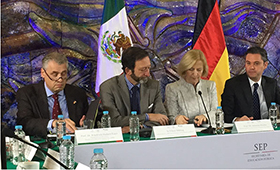
|
|||||||||||||||||||||||
|
|||||||||||||||||||||||
|
|||
|
The circumstances facing refugees in Germany are largely dependent on their integration into education, training and employment. It is now time for the legal, financial and institutional framework conditions to be translated into relevant action. In light of this, what are the demands facing institutions and individuals involved within vocational education and training? And how might they contribute to ensure that refugees receive support which is in line with their school-based and vocational qualifications, and are integrated in society? |
|||
|
Editorial: Providing qualifications for refugees - Starting points for a vocational training master plan Friedrich Hubert Esser, Professor Dr., President of the Federal Institute for Vocational Education and Training (BIBB)
Millions of people are fleeing war, violence and threat - and many are seeking protection in Europe. Granting humanitarian protection can only be a first step to taking in refugees with prospects of permanent residency and integrating them in our society. Moving on from this, education, training and qualifications are essential. This requires a master plan outlining an agreed approach and on the basis of which the tasks ahead and related responsibilities can be clearly identified.
|
|||
|
Opportunities and challenges posed by the early integration of refugees Interview with Prof. Dr. Christine Langenfeld, Chairwoman of the Expert Council of German Foundations on Integration and Migration
The huge number of people fleeing regions affected by civil war and seeking refuge in Europe presents enormous challenges for countries which receive them. Asylum policy in Germany has undergone a transformation when compared to the mid-1990s. For refugees with good prospects of remaining, the focus is now on integrating them into society, education and training, and employment as quickly as possible. How can we do this? Which hurdles must be overcome, and which state and civil society institutions must respond?
Read more Opportunities and challenges posed by the early integration of refugees |
|||
|
Recognizing vocational qualifications of refugees - examples from "Prototyping Transfer" Carolin Böse, Dinara Tusarinow, Tom Wünsche
The Recognition Act which entered into force on 1 April 2012 aims to provide better employment opportunities in training occupations for people with foreign vocational qualifications. This option is also of interest for refugees, many of whom were unable to bring with them the relevant documents needed for the vocational qualification to be recognised, such as a diploma or employment reference. However, under certain circumstances, a recognition procedure may also be carried out without documents by means of skills analysis. The article examines this option which is enshrined in the Professional Qualifications Assessment Act (BQFG), and presents initial experiences of its implementation. Read more Recognizing vocational qualifications of refugees - examples from "Prototyping Transfer" |
|||
|
|||
|
Right in the middle of a meeting with international project and business partners, and one of the German participants is struggling to come up with the correct English equivalents for the terms such as "Berufseinstiegsbegleitung", "Einstiegsqualifizierung" and "Ausbildungsbausteine". Fortunately, help is at hand in the form of a new brochure issued by the Federal Institute for Vocational Education and Training (BIBB). The aim of the German-English Glossary of Vocational Education and Training Terminology is to act as a valuable practical aid for VET experts by assisting with the understanding and translation of specialist texts and thus facilitate communication at an international level, an aspect of work that is becoming increasingly important. Read more A BIBB glossary for VET specialists |
|||
|
|||
|
4. International BIBB/IAB/ZEW Conference - September 07 - 09, 2016 · ZEW Mannheim
The German Federal Institute for Vocational Education and Training (BIBB), the Institute for Employment Read more Call for papers:. 4. International BIBB/IAB/ZEW Conference - September 07 - 09, 2016 · ZEW Mannheim |
|||
|
|||||||||||||
|
|||||||||||||
|
|||
|
President Esser travelled to Mexico and Costa Rica
Read more President Esser travelled to Mexico and Costa Rica |
|||
|
Strengthening international cooperation -President Esser spoke about "Economy 4.0" in China
Read more President Esser spoke about "Economy 4.0" in China |
|||
|
Further development of Mexican model of dual education and training Pilot projects in education and training have been running in Mexico under the Mexican model of dual education and training (Modelo Mexicano de Formación Dual, MMFD) since 2013. The MMFD is based on the system of dual education and training in Germany. Mexican and German stakeholders will continue to develop the MMFD together in 2016. This will be supported by the Federal Institute for Vocational Education and Training, and the German Office for International Cooperation in Vocational Education and Training in the BIBB (BIBB/GOVET). Read more Further development of Mexican model of dual education and training |
|||
|
Chilean reform of education and training
Read more Chilean reform of education and training |
|||
|
Columbia: Costs and benefits of vocational education and training An expert workshop on the subject of "The costs and benefits of vocational education and training" was organised by the BIBB and SENA, the national vocational education and training service (Servicio Nacional de Aprendizaje), as part of "World Skills Colombia 2015". This was linked to the four current SENA pilot projects relating to dual education and training in the automotive, textiles, poultry farming and food sector and was also used to plan activities for the coming year. Read more Columbia: Costs and benefits of vocational education and training |
|||
|
Initial results from the cost-benefits survey on the Philippines The first results from a survey of the costs and benefits of company-based training on the Philippines were presented at the 3rd Regional Vocational Education and Training Conference in Laos and at a Stakeholder Workshop in Manila. They were met with considerable interest and were the object of controversial discussion. The final results are expected to be available in June 2016. Read more Initial results from the cost-benefits survey on the Philippines |
|||
|
Slovenia: New models of work-based learning
Read more New models of work-based learning |
|||
|
iMOVE: Success Stories Medical and Geriatric Care Sector The "Developing Skills for Employability with German Partners - 8 Success Stories from the Medical and Geriatric Care Sector" brochures presents eight vocational education and training success stories of German and international partners. Read the new edition of the sector-specific success stories from the medical and geriatric care sector. |
|||
| Imprint | |
|
Bundesinstitut für Berufsbildung (BIBB) Friedrich-Ebert-Allee 114 – 116 Editorial Team: |
|


.jpg)
.jpg)
